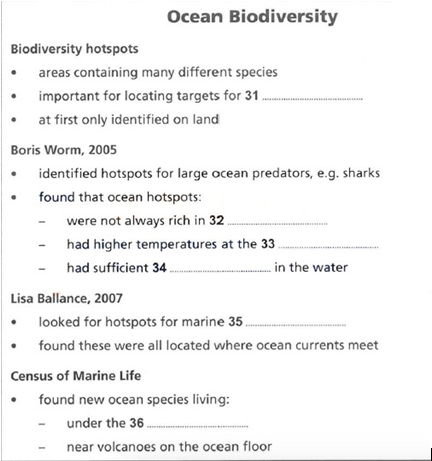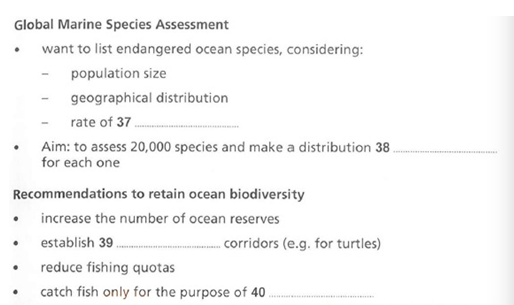众所周知,雅思听力四个部分难度由浅入深,所以section4对于很多同学来说成为难以逾越的鸿沟。语速快跟不上、内容专业化、同义替换转换不过来等等问题都是影响我们同学填不上来的原因。那么我们就来谈一谈如何才能有效地攻破雅思听力中的section4笔记填空。
雅思听力第四部分10题中间无停顿,同义替换多、难度大,所以我们同学应该先保证能跟得上文章的大体结构,不能“掉队”,否则将会陷入“一步跟不上,步步跟不上”的恶性循环。但是我们都知道这一部分笔记结构特别明显,块与块的界限很清晰,那要想保证整体进度能跟上,我们就要了解出题人给我们的信号词提示。第四部分的信号词可以分为两类:宏观信号词和微观信号词。
宏观信号词包括:
• What I’m going to talk about is…
• I’ve been looking at...
• We’ll see that...
• Let’s look at...
• To begin with... And then... Another...is
• The problem here is...
• The next thing is...
• So finally...
准确地把握这些信号词就会让我们不轻易“掉队”,但是出现这些信号词并不意味着就能准确地听到答案,所以微观信号词依然重要,因为他们预示着答案呼之欲出。
微观信号词包括:
•转换:well, Ok, now, and, all right
•时间:at that time, after this, for the moment, eventually
•因果: then, because, since, so, therefore
•对比:but, only, on the other hand, rather than
•强调:you see, actually, in fact, as you know
把握住以上两种信号词预示着我们已经成功一半了,有很多同学会说:“我也知道去听以上两类信号词,甚至已经精确到句子了,但是答案还是填错了。”那这个时候我们需要怎么办呢?我们先不着急寻求答案。让我们先来看几个短语:
a degree of distortion the impact of humans
the presence of water the surface of the ocean
very high concentrations of food the decline of the species
我们知道雅思听力填空题以填名词颇多。上面左右两组短语是听力音频中常见的答案出处,但是上面两组强调的名词并不同。同学们仔细研究你会发现左侧短语强调的是of后面的名词,因为of前的名词都是表示“程度”“量”;而右侧短语强调的是of前面的名词。弄清楚了A of B 究竟是强调谁的问题,填空时就省了很多力气。
我刚才提到听力填空题填的大多数是名词,其它词性由于在一句话中出现频率通常只有一次,所以如果填形容词我们只需去听形容词即可。但是名词出现的概率很高,所以我们就得进行筛选。通常section4里填名词时,它在音频中会以以下几种方式存在:
• 1. n+ of+ n
• 2. prep+ n
•3. n+ 定语
•4. 定语+ n
也就是说,我们定位到一小块甚至是一句时,如果填名词,我们只需要认真去听音频中是否有上面提到的四种名词的任何一种,即:
1)A of B 的情况,再分析一下强调的是A还是B
2)介词+名词的情况
3)名词+定语从句/后置定语
4)定语(adj)+名词
如果听到这四种的任何一种情况,我们毫不犹豫地将名词填进去即可。
以上方法是否有效呢?让我们以剑11 Test1 Section4 为例来验证一下。


上面全部10题均需填名词,我们来看一下听力文本:(加粗部分是答案)
31. These hotspots are significant because they allow us to locate key areas for focusing efforts at conservation. (prep+n)
32. The main thing he had expected to find was that they had very high concentrations of food. (A of B)
33. The water at the surface of the ocean had relatively high temperatures. (A of B)
34. because he also found that the water needed to have enough oxygen in it. (adj + n)
35. what she was interested in was marine mammals, things like seals. (adj + n)
36. One thing they found there which stunned other researchers was that there were large numbers of species which live below the ice. (prep+n)
37. then thirdly they calculate the rate at which the decline of the species is happening. (A of B)
38. For each one they assess; they use the data they collect on that species to produce a map showing its distribution. (n+定语)
39. We need to create corridors for migration. (prep + n)
40. so that only the fish wanted for consumption were caught. (prep + n)
总结一下今天的核心思想,雅思听力section4时定位到句子后重点去听有修饰的名词。
以上就是沈阳新航道小编为大家整理的教你游刃有余地“蒙”雅思听力的笔记填空,希望对大家有帮助,更多资讯、资料请访问沈阳新航道雅思频道。